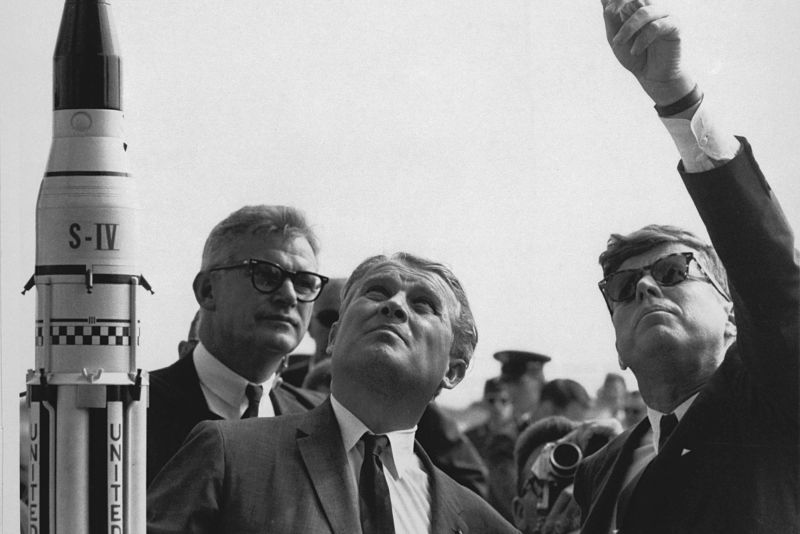
Almost two-thirds of Americans agree that the space program's costs are justified. And fewer think that NASA's budget should be reduced or abolished than at any time since 1986. Those were two of the results from polling conducted by Gallup for the 50th anniversary of the Moon landing. The poll found a clear upward trend for support for space exploration, starting at 41% in 1979 and rising to 64% by 2019.
But much less is known about why different Americans are in favor of space exploration. That would be useful information for policymakers—of all stripes—who hope to convince the public to open their wallets. It's a question that David Burbach, a political scientist at the US Naval War College in Rhode Island, has sought to answer in a new study published in the journal Space Policy.
Crossed priorities
Previous work has identified demographic or social differences in public support for the space program. Being young, white, male, or more highly educated all correlate with greater support for NASA than being older, non white, female, or having a lower educational attainment. Evangelical Christians are more lukewarm on the idea than the rest of the nation, but as it turns out there's not much of a split between Republican and Democratic voters on the topic.
The 2018 Pew survey we mentioned above found that even though public support for NASA is strong, the agency's priorities aren't shared by the public. NASA is focused on crewed missions to the Moon and Mars, while the public overwhelmingly wants the agency to monitor our climate and defend us from killer asteroids.
The problem facing anyone trying to assign motives for the support for the space program is that you have to ask them the right question in order to get their feelings. Unfortunately, while public attitudes toward the space program have been polled since the dawn of the space age, motivations have not been well explored. So Burbach set out to find the answers another way, correlating opinions on space program spending with other, better-studied attitudes, like those toward the military or the environment. If, for example, there's a weak correlation between supporting space exploration and defense spending among Democrats, that could be useful information when proposing an increase in NASA's budget to the House of Representatives.
Burbach's data set comes from the General Social Survey, which has polled Americans since 1972, at first annually and later every other year. Overall, this study includes about 62,000 cumulative respondents from 1973 to 2016. Using that data, he looked at correlations between support for funding the space program and funding the military, funding for the environment, funding for social programs, and finally with "confidence in science." He then looked to see if those correlations differed by political affiliation.
Small trends
Although there is a link between political affiliation and support for the space program, it's small. Once other variables have been controlled, "the model predicts a Democrat would have a 10 percent probability of wanting greater spending, and a Republican would have a 14 percent probability." As expected, Americans who supported higher military spending also favored more space funding. There was even higher support for increasing space funding among respondents who had high confidence in science, and a small but positive correlation between support for the environment and space funding.
When Burbach added party affiliation to the analysis, the differences turned out to be pretty minor. Republicans who support the space program are less likely to support welfare spending, and Democrats and independents who support the environment are slightly more likely to support the space program. Burbach didn't see the expected negative correlation between space and social funding among Democrats.Next, Burbach looked at how those various correlations have trended over time. The demographic splits identified earlier have narrowed since 1973, thanks to increasing support for the space program among women and non-whites. The gap in support between different levels of academic achievement has narrowed most significantly since the 1970s. But the trends within each party group are much smaller.
Since the 1970s, Democrats who support space funding have become a little less supportive of military spending and a little more supportive of environmental spending. But the trends for Republicans and these two categories have been flat. And both Democrats and Republicans who support space funding have become more supportive of social spending. Finally, support for space funding has grown among Democrats who have confidence in science, but not among Republicans.
In such contentious times, it's good to see that one's political biases have such a minor effect on support for space. However, Burbach cautions that framing support for space exploration as a national security issue for Republicans and an environmental one for Democrats may lead to trouble down the road if "negative partisanship"—opposing something because your political opponents support it—takes effect.
Space Policy, 2019. DOI: 10.1016/j.spacepol.2019.08.001 (About DOIs)
"nasa" - Google News
November 12, 2019 at 08:17PM
https://ift.tt/2O0b0fS
Partisan differences show up in reasons why Americans support NASA - Ars Technica
"nasa" - Google News
https://ift.tt/2pR2oQP
Shoes Man Tutorial
Pos News Update
Meme Update
Korean Entertainment News
Japan News Update
Bagikan Berita Ini














0 Response to "Partisan differences show up in reasons why Americans support NASA - Ars Technica"
Post a Comment